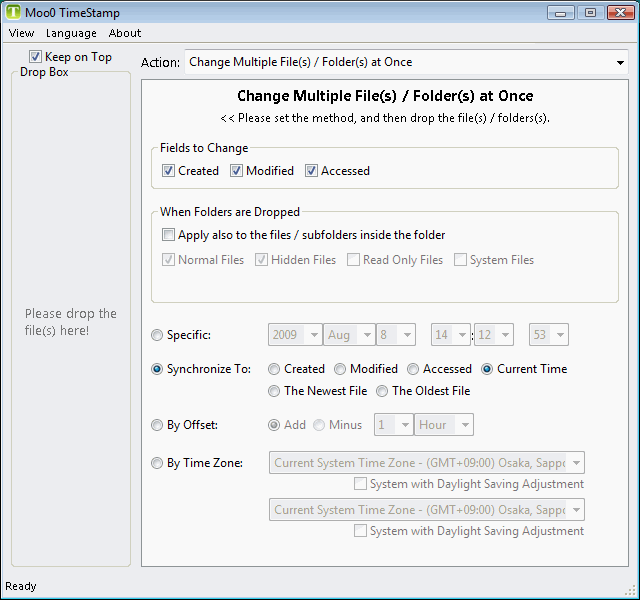- These MEX-functions get and set the creation, access and write times of a file under Windows. SetFileTime(FileName, Spec, DateVector, Type) FileName: File or folder name, absolute or relative path.
- FILETIME: 100-nanoseconds since Jan 1 1601: 6000004:8BC25000.
NTFS Timestamp Reports. These operating systems report timestamps in local time. However, conversion between UTC and local time is based on the difference between UTC and local time at the time of conversion, instead of that in effect when the file event occurred.Consequently, if daylight saving time is currently in effect, all file events around the year will be reported in DST.
| Language | ||||
| Standard Library Headers | ||||
| Freestanding and hosted implementations | ||||
| Named requirements | ||||
| Language support library | ||||
| Concepts library(C++20) | ||||
| Diagnostics library | ||||
| Utilities library | ||||
| Strings library | ||||
| Containers library | ||||
| Iterators library | ||||
| Ranges library(C++20) | ||||
| Algorithms library | ||||
| Numerics library | ||||
| Localizations library | ||||
| Input/output library | ||||
| Filesystem library(C++17) | ||||
| Regular expressions library(C++11) | ||||
| Atomic operations library(C++11) | ||||
| Thread support library(C++11) | ||||
| Technical Specifications |
File Timestamp Python

| Classes | ||||
| Functions | ||||
| File types |
Defined in header <filesystem> | |
using file_time_type =std::chrono::time_point</*trivial-clock*/>; | (since C++17) (until C++20) |
using file_time_type =std::chrono::time_point<std::chrono::file_clock>; | (since C++20) |
Represents file time.
| (until C++20) |
[edit]Example
Filetimetosystemtime
Possible output:
[edit]See also
(C++17) | gets or sets the time of the last data modification (function)[edit] |
File Time Editor
- Class
File Timestamp Format
Class FileTime
- java.nio.file.attribute.FileTime
- All Implemented Interfaces:
- Comparable<FileTime>
Represents the value of a file's time stamp attribute. For example, it may represent the time that the file was lastmodified,accessed, orcreated.Instances of this class are immutable.
- Since:
- 1.7
- See Also:
Files.setLastModifiedTime(java.nio.file.Path, java.nio.file.attribute.FileTime),Files.getLastModifiedTime(java.nio.file.Path, java.nio.file.LinkOption...)
Method Summary
Methods Modifier and Type Method and Description intcompareTo(FileTime other)Compares the value of twoFileTimeobjects for order.booleanequals(Object obj)Tests thisFileTimefor equality with the given object.static FileTimefrom(long value, TimeUnit unit)Returns aFileTimerepresenting a value at the given unit of granularity.static FileTimefromMillis(long value)Returns aFileTimerepresenting the given value in milliseconds.inthashCode()longto(TimeUnit unit)Returns the value at the given unit of granularity.longtoMillis()StringtoString()Returns the string representation of thisFileTime.Methods inherited from class java.lang.Object
clone, finalize, getClass, notify, notifyAll, wait, wait, wait
Method Detail
from
Returns aFileTimerepresenting a value at the given unit of granularity.- Parameters:
value- the value since the epoch (1970-01-01T00:00:00Z); can be negativeunit- the unit of granularity to interpret the value- Returns:
- a
FileTimerepresenting the given value
fromMillis
Returns aFileTimerepresenting the given value in milliseconds.- Parameters:
value- the value, in milliseconds, since the epoch (1970-01-01T00:00:00Z); can be negative- Returns:
- a
FileTimerepresenting the given value
to
Returns the value at the given unit of granularity.Conversion from a coarser granularity that would numerically overflow saturate to
Long.MIN_VALUEif negative orLong.MAX_VALUEif positive.- Parameters:
unit- the unit of granularity for the return value- Returns:
- value in the given unit of granularity, since the epoch since the epoch (1970-01-01T00:00:00Z); can be negative
toMillis
Returns the value in milliseconds.Conversion from a coarser granularity that would numerically overflow saturate to
Long.MIN_VALUEif negative orLong.MAX_VALUEif positive.- Returns:
- the value in milliseconds, since the epoch (1970-01-01T00:00:00Z)
equals
Tests thisFileTimefor equality with the given object.The result is
trueif and only if the argument is notnulland is aFileTimethat represents the same time. This method satisfies the general contract of theObject.equalsmethod.- Overrides:
equalsin classObject- Parameters:
obj- the object to compare with- Returns:
trueif, and only if, the given object is aFileTimethat represents the same time- See Also:
Object.hashCode(),HashMap
hashCode
Computes a hash code for this file time.The hash code is based upon the value represented, and satisfies the general contract of the
Object.hashCode()method.- Overrides:
hashCodein classObject- Returns:
- the hash-code value
- See Also:
Object.equals(java.lang.Object),System.identityHashCode(java.lang.Object)
compareTo
Compares the value of twoFileTimeobjects for order.- Specified by:
compareToin interfaceComparable<FileTime>- Parameters:
other- the otherFileTimeto be compared- Returns:
0if thisFileTimeis equal toother, a value less than 0 if thisFileTimerepresents a time that is beforeother, and a value greater than 0 if thisFileTimerepresents a time that is afterother
toString
Returns the string representation of thisFileTime. The string is returned in the ISO 8601 format: where '[.s+]' represents a dot followed by one of more digits for the decimal fraction of a second. It is only present when the decimal fraction of a second is not zero. For example,FileTime.fromMillis(1234567890000L).toString()yields'2009-02-13T23:31:30Z', andFileTime.fromMillis(1234567890123L).toString()yields'2009-02-13T23:31:30.123Z'.A
FileTimeis primarily intended to represent the value of a file's time stamp. Where used to represent extreme values, where the year is less than '0001' or greater than '9999' then this method deviates from ISO 8601 in the same manner as the XML Schema language. That is, the year may be expanded to more than four digits and may be negative-signed. If more than four digits then leading zeros are not present. The year before '0001' is '-0001'.- Overrides:
toStringin classObject- Returns:
- the string representation of this file time
- Class

- Summary:
- Nested |
- Field |
- Constr |
Texas Efile Time

- Detail:
- Field |
- Constr |
Submit a bug or feature
For further API reference and developer documentation, see Java SE Documentation. That documentation contains more detailed, developer-targeted descriptions, with conceptual overviews, definitions of terms, workarounds, and working code examples.
Copyright © 1993, 2020, Oracle and/or its affiliates. All rights reserved. Use is subject to license terms. Also see the documentation redistribution policy.
Scripting on this page tracks web page traffic, but does not change the content in any way.
